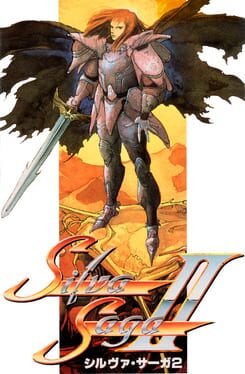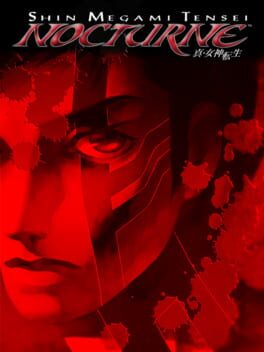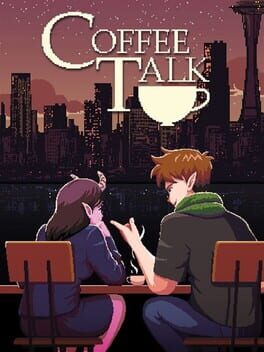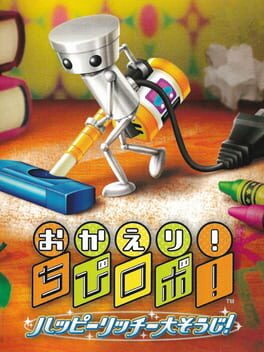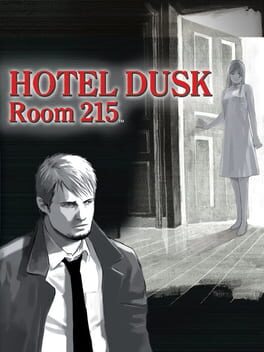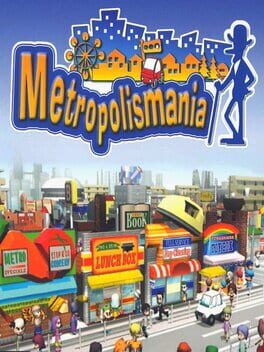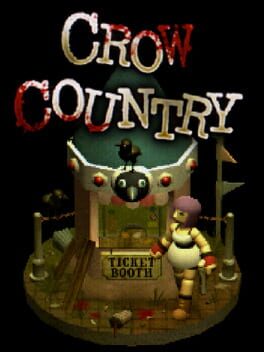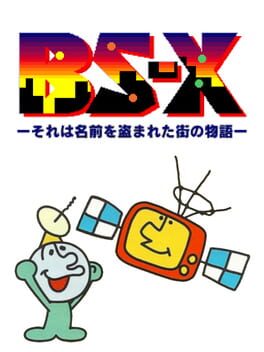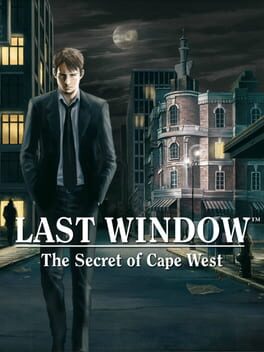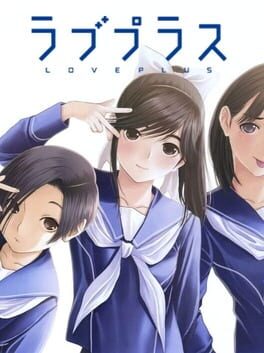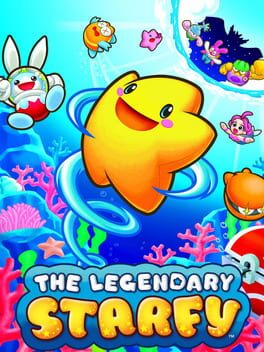DizzySkullKid19
483 Reviews liked by DizzySkullKid19
Kinda cool game. The graphics arent great but the characters have some decent animations and there's things like reflections in water because why the hell not? Feels very Dragon Quest inspired maybe to the point of nearly being a clone. It feels more open like the first DQ, but there's more stuff to do than that game. You can hire mercenaries to fight in your place and there's also "idols" that can fight in your place (Pokemon/statue things that you find in chests). Kinda weird but the mercenaries and idols make a separate party each, you choose which party fights at the start of battle. Seems like you can always switch to one of them from your main party, but once you do it's basically auto-battle mode for the mercenary or idol party and you can't exit it. The mercenaries were fairly cheap so I got two of them and they make pretty quick work of regular enemies and bosses. I think my only complaint is that this might potentially make this game way too easy.
Make sure you search absolutely everything, there's lots of hidden items and money to collect.
The fan translation feels pretty good. I know people get autistic about translations not being true to the original, but sometimes being true also leaves things a bit lifeless, so whoever did this one, good job on that. IMO
(I can make fun of autists because I am in my own way about other things right?)
Seems like a game I might want to complete.
Make sure you search absolutely everything, there's lots of hidden items and money to collect.
The fan translation feels pretty good. I know people get autistic about translations not being true to the original, but sometimes being true also leaves things a bit lifeless, so whoever did this one, good job on that. IMO
(I can make fun of autists because I am in my own way about other things right?)
Seems like a game I might want to complete.
Coffee Talk
2020
maybe a little too sweet for me...
the art is fantastic, and hanging out in the coffee shop is nice for sure. my issue is that despite talking about big issues like Racism and Capitalism and What Am I Doing With My Life, the weight of the characters' problems is tempered in order for the game to be cozy and wholesome. I also kind of feel like this game chooses to be set in America without really engaging with what it means to be set in America? for example having a Chill Cop character is dumb as hell.
still it's nice to hear these people's stories and to think about nice drinks. the audiovisual design rules and most of the characters are likeable. also, what the fuck happened at the end there????
lastly, it's a shame about Mohammad Fahmi's passing -- from what I've read it seems like he was a positive guy, and I can imagine him being an inspiration to people from Indonesia and elsewhere. I'll probably play his game What Comes After, too.
the art is fantastic, and hanging out in the coffee shop is nice for sure. my issue is that despite talking about big issues like Racism and Capitalism and What Am I Doing With My Life, the weight of the characters' problems is tempered in order for the game to be cozy and wholesome. I also kind of feel like this game chooses to be set in America without really engaging with what it means to be set in America? for example having a Chill Cop character is dumb as hell.
still it's nice to hear these people's stories and to think about nice drinks. the audiovisual design rules and most of the characters are likeable. also, what the fuck happened at the end there????
lastly, it's a shame about Mohammad Fahmi's passing -- from what I've read it seems like he was a positive guy, and I can imagine him being an inspiration to people from Indonesia and elsewhere. I'll probably play his game What Comes After, too.
Probably the most impressive game on the ds i have played. The enviroment and characters look really good. The sidequest and story of this game is really charming and fun for the most part. The balance of resource management with sandbox exploration is a really fun gameplay loop. In the endgame i found some of the dust and thrash collecting to become a bit repetetive especially when the money requirements became really high. The casino also works but is highly luck dependent.
Hotel Dusk: Room 215
2007
At first glance, you might think this is a hardboiled detective story featuring a cynical retired cop, but it really isn't. Our protagonist is on a personal quest, seeking the truth behind incidents happened to him prior. By accident or by design, he meets the colorful residents of Hotel Dusk, all of them having something to do with the truth he is seeking. He has exactly one night to figure it out, in a motel where no one is coming or leaving. Indeed, the setup is a classic "insulated mansion in a stormy night" rather than the sprawling metropolis where the hardboiled detectives usually dwell. Thankfully, nobody dies in this game, and the worst thing that could happen to our protagonist is getting kicked out. The detective work here is done mostly by talking to people (with some poorly designed puzzle solving in the mix). There is no gun in this story. The plot meanders quite a bit, with each side character has their own little arch. Sometimes it's not clear what to do next with the event that triggers plot progression seemingly coming out of nowhere.
A rhythm game spinoff of the Sylvanian family game boy games, this came out a few months after the first game. It looks like a collaboration with Natsume and Epoch - perhaps evidenced in a different and more fleshed out art style. The animals dancing during the songs are surprisingly elaborate, and each stage has a cute visual theme sort of like beatmania or something.
Weirdly though the songs seem to just be original to the game (or maybe some other mixed media related to the series), none of the songs from the first game seem to appear in this.
The game itself is simple, there's three directions to press (Down, A, B) and the songs are short. I think it took me like 15 minutes to play through the game. There's also a mode where you can record yourself 'playing drums' to other songs and save them as 'videos'. Kind of like a rudimentary wii music or something.
Overall it's cute and solid for what it is, but feels like a brand tie-in more than anything.
Weirdly though the songs seem to just be original to the game (or maybe some other mixed media related to the series), none of the songs from the first game seem to appear in this.
The game itself is simple, there's three directions to press (Down, A, B) and the songs are short. I think it took me like 15 minutes to play through the game. There's also a mode where you can record yourself 'playing drums' to other songs and save them as 'videos'. Kind of like a rudimentary wii music or something.
Overall it's cute and solid for what it is, but feels like a brand tie-in more than anything.
Metropolismania
2001
One of those instances of a simple series game getting localised into English. The mall pizza of Japanese video games. Incredibly scuffed translation (positive connotation, it's pretty amusing), everyone speaks super bluntly and in totally unrelated one-sentence statements like that one Britney Spears tweet. There were also a few quirks with the dialog not being quite right in some instances like a woman saying she had to go home to her wife (cool, but they probably didn't mean to do that), or a 15 year old talking about their kid learning to read? Overall not a bad afternoon if you're like me and have an affinity for janky budget sim games.
Crow Country
2024
This will sound like a backhanded compliment but it almost cozy-ifies the classic survival horror. All the basics of the genre are there - the specific suite of weapons (handgun/shotgun/magnum/flamethrower), the UI aesthetics, save rooms, post-game unlocks etc. Yet both tonally and formally it is much less oppressive. Enemies and traps are plentiful but so are resources. The nasties themselves are gruesome and the environments dingy but the writing is frequently leaning towards the humorous and compassionate. The PS1-style, avowedly FF7-evoking graphics/framing of scenes, an OST that's low-key even when dissonant and lumpy character models imbue a sense of nostalgic warmth into things.
The game still carries an unnerving air as the walls groan and creak but it isn't 'scary' or tense in any real sense, more so a rather pleasant jaunt through a singular, heavily interconnected level. The satisfaction comes from the expected gameplay facets: uncovering new areas, becoming familiar with the various paths, solving the kinds of puzzles you've seen in RE/SH (with some charming mixups and occasionally multiple solutions/even multiple ways to find those solutions), finding keys, reading notes - you know the deal but it's all very well-crafted. Progression hits a sweet spot of not so taxing that you'll get stuck for ages yet sprinkles in enough moments where you have to actually stop and think or carefully observe your surroundings, with enemies more of a bit of light friction on top instead of a proper threat. There's a suprising flexibility to the order in which you can do things or when events play out to be discovered on multiple playthroughs. And, as is standard, with the genre replays are heavily incentivized via a nice compact runtime alongside getting higher completion ranks.
It's a strange experience, in a positive sense. A game that is recognisably 'survival horror' in all respects but ends up being comforting to play. Genuinely quite a feat to create something that replicates influences closely yet feels different due to just a few smart changes. The presentation is the big star of that. Every room is gorgeous and rich with atmosphere. Leverages an older style but adds to it using modern lighting techniques and grater detail, losing not an ounce of character in the process. Love some fixed camera angles but having control over the camera along only the horizontal axis is nice, it allows them to hide little things for you to find by rotating it, an almost diorama feel when combined with how the assets are constructed. Builds to a nice little mystery near the end of its story too. Strong, confident work! There's a hard mode coming in a future update for something a little spicier.
The game still carries an unnerving air as the walls groan and creak but it isn't 'scary' or tense in any real sense, more so a rather pleasant jaunt through a singular, heavily interconnected level. The satisfaction comes from the expected gameplay facets: uncovering new areas, becoming familiar with the various paths, solving the kinds of puzzles you've seen in RE/SH (with some charming mixups and occasionally multiple solutions/even multiple ways to find those solutions), finding keys, reading notes - you know the deal but it's all very well-crafted. Progression hits a sweet spot of not so taxing that you'll get stuck for ages yet sprinkles in enough moments where you have to actually stop and think or carefully observe your surroundings, with enemies more of a bit of light friction on top instead of a proper threat. There's a suprising flexibility to the order in which you can do things or when events play out to be discovered on multiple playthroughs. And, as is standard, with the genre replays are heavily incentivized via a nice compact runtime alongside getting higher completion ranks.
It's a strange experience, in a positive sense. A game that is recognisably 'survival horror' in all respects but ends up being comforting to play. Genuinely quite a feat to create something that replicates influences closely yet feels different due to just a few smart changes. The presentation is the big star of that. Every room is gorgeous and rich with atmosphere. Leverages an older style but adds to it using modern lighting techniques and grater detail, losing not an ounce of character in the process. Love some fixed camera angles but having control over the camera along only the horizontal axis is nice, it allows them to hide little things for you to find by rotating it, an almost diorama feel when combined with how the assets are constructed. Builds to a nice little mystery near the end of its story too. Strong, confident work! There's a hard mode coming in a future update for something a little spicier.
Shenmue
1999
Another comfort game. I love when a game is fully committed to making you engage in really mundane tasks. Walking down the hill from your home, passing all the other houses on your way into town, maybe trying your luck with the gacha along the way, making sure to grab some cat food on the way back home, slowly crossing things off your checklist. This shit is exciting to me. Shenmue nails all of that perfectly. Over the course of the game, I became intimately familiar with Yokosuka and its denizens. It almost felt like a second home. It’s one of my favourites. I love it.
I've always felt like the most underappreciated aspect of any gaming system is the ability to have fun with it even if you don't have any games. Granted it wasn't until a certain stage of technological development that this really became practical; at least in the early days, many consoles simply checked to see if there was something in them and then booted it up. Starting somewhere around the fifth generation of consoles, though, your fancy box might actually be able to do more than just look for software. Whether it's the PS1 and its nifty little CD player, the Nintendo DS's Pictochat and the 3DS' extensive Streetpass suite, or the Wii's plethora of superfluous little Channels - even specially made pack-in titles like Astro's Playroom - it's always nice to have a reason to power on no matter how barren your shelf might be. Amongst them all, though, Nintendo's Satellaview felt weirdly ahead of its time in a few key ways, and I can't think of anything else quite like it even today.
The Satellaview is an oddity that I've always found deeply charming but have unfortunately never had the opportunity to experience myself. If you're not familiar, Nintendo developed a satellite modem add-on for the Super Famicom alongside broadcasting company St.GIGA. Released in 1995, it connected to the bottom of the console and gave subscribers access to all sorts of content - primarily games, and you could keep one downloaded and stored until you replaced it. But you could also access popular gaming and news publications of the time such as Famitsu, as well as audio broadcasts ranging from music to celebrity interviews. There were even games designed to have live voice acting provided during gameplay. Yes, live! Can you imagine? It's the kind of thing that, unless somebody had the foresight to record it, could only be experienced once. Eat your heart out, Amazon Luna. Of course, the Satellaview had remarkable third-party support for the time, and there were games released for it that have never been re-released (and some that have been, though not in quite the same form). Some noteworthy examples are a remake of the original The Legend of Zelda and a sequel of sorts to A Link to the Past, as well as the first release of Radical Dreamers, which served as a "bridge" between Chrono Trigger and Chrono Cross. I'm not really here to talk about any of that, though. I want to talk about the Satellaview itself and how it presented itself to the player.
Upon booting up for the first time, you'd be greeted by a talking TV who would ask you for your name. After this brief introduction, you'd be dumped into a little city that positively smacks of Mother/Earthbound. All around you were buildings that weren't just for show: While some were there to provide services to the player character, others served as gateways into the Satellaview's various features. A hub level, if you will. This contextualization of a console's menus as a physical location to explore is absolutely adorable and if it's been done elsewhere, I'm struggling to think of examples. Of course, while not being especially game-y on its own, you do have an inventory and currency and can purchase items or upgrades for your character. There's ostensibly a plot of some kind to follow; I'm not totally sure what it is myself, but if the name is anything to go by, I'd assume it involves a town that had its name stolen. It even comes with a sweet little OST of its own! It's an outrageously cool concept, and I'd love to see somebody pick it up and go even further with it. How about some kind of Animal Crossing-style life sim that likewise runs on the system's internal clock? You could decorate your house with goodies from games you've played and visit the houses of friends you've added, which might show up in your own personal town. Maybe you could freely move buildings around for ease of access and get everything set up just the way you like it. I'm not gonna spend all day dreaming about it, but it has a ton of potential. Of course, I reckon it's fair to assume that most devs would pass on it simply because of how much effort would need to go into it when a simple menu interface would suffice. But it would do a ton to add to the charm of a device, especially considering how dull systems like the Switch are before you actually launch some software.
Sadly, just getting your hands on an old Satellaview system and plugging it in won't avail you of much. Nintendo's relationship with St.GIGA soured towards the end of the add-on's lifetime and the service was ended about five years after its launch. St.GIGA itself went bankrupt and was absorbed into Japanese media company WireBee. There's nothing to find on the air anymore, and even if there was, there were so many one-time broadcasts that you'd never get the full experience. Hasn't stopped people from trying to restore what they can, because of course it hasn't. Whether it's the BIOS or the games themselves, there are still ways you can recapture that magic, even if only for a moment. As always, I salute those who are so dedicated to preserving the past - because there's so much I'd miss out on if not for them.
The Satellaview is an oddity that I've always found deeply charming but have unfortunately never had the opportunity to experience myself. If you're not familiar, Nintendo developed a satellite modem add-on for the Super Famicom alongside broadcasting company St.GIGA. Released in 1995, it connected to the bottom of the console and gave subscribers access to all sorts of content - primarily games, and you could keep one downloaded and stored until you replaced it. But you could also access popular gaming and news publications of the time such as Famitsu, as well as audio broadcasts ranging from music to celebrity interviews. There were even games designed to have live voice acting provided during gameplay. Yes, live! Can you imagine? It's the kind of thing that, unless somebody had the foresight to record it, could only be experienced once. Eat your heart out, Amazon Luna. Of course, the Satellaview had remarkable third-party support for the time, and there were games released for it that have never been re-released (and some that have been, though not in quite the same form). Some noteworthy examples are a remake of the original The Legend of Zelda and a sequel of sorts to A Link to the Past, as well as the first release of Radical Dreamers, which served as a "bridge" between Chrono Trigger and Chrono Cross. I'm not really here to talk about any of that, though. I want to talk about the Satellaview itself and how it presented itself to the player.
Upon booting up for the first time, you'd be greeted by a talking TV who would ask you for your name. After this brief introduction, you'd be dumped into a little city that positively smacks of Mother/Earthbound. All around you were buildings that weren't just for show: While some were there to provide services to the player character, others served as gateways into the Satellaview's various features. A hub level, if you will. This contextualization of a console's menus as a physical location to explore is absolutely adorable and if it's been done elsewhere, I'm struggling to think of examples. Of course, while not being especially game-y on its own, you do have an inventory and currency and can purchase items or upgrades for your character. There's ostensibly a plot of some kind to follow; I'm not totally sure what it is myself, but if the name is anything to go by, I'd assume it involves a town that had its name stolen. It even comes with a sweet little OST of its own! It's an outrageously cool concept, and I'd love to see somebody pick it up and go even further with it. How about some kind of Animal Crossing-style life sim that likewise runs on the system's internal clock? You could decorate your house with goodies from games you've played and visit the houses of friends you've added, which might show up in your own personal town. Maybe you could freely move buildings around for ease of access and get everything set up just the way you like it. I'm not gonna spend all day dreaming about it, but it has a ton of potential. Of course, I reckon it's fair to assume that most devs would pass on it simply because of how much effort would need to go into it when a simple menu interface would suffice. But it would do a ton to add to the charm of a device, especially considering how dull systems like the Switch are before you actually launch some software.
Sadly, just getting your hands on an old Satellaview system and plugging it in won't avail you of much. Nintendo's relationship with St.GIGA soured towards the end of the add-on's lifetime and the service was ended about five years after its launch. St.GIGA itself went bankrupt and was absorbed into Japanese media company WireBee. There's nothing to find on the air anymore, and even if there was, there were so many one-time broadcasts that you'd never get the full experience. Hasn't stopped people from trying to restore what they can, because of course it hasn't. Whether it's the BIOS or the games themselves, there are still ways you can recapture that magic, even if only for a moment. As always, I salute those who are so dedicated to preserving the past - because there's so much I'd miss out on if not for them.
Hotel Dusk will always have more personal significance as it was first and because of when it came out but this has been growing in my favor with each playthrough.
wonderful contained setting and cast of characters that ends up feeling larger than the first due to the stakes involved. the music is once again absolutely incredible with this possibly taking the crown for my favorite of the two.
hopefully the Another Code remakes did well enough for the Kyle Hyde saga to see something too.
wonderful contained setting and cast of characters that ends up feeling larger than the first due to the stakes involved. the music is once again absolutely incredible with this possibly taking the crown for my favorite of the two.
hopefully the Another Code remakes did well enough for the Kyle Hyde saga to see something too.
This review will be talking about both Hotel Dusk and Last Window as what makes them such great titles are shared between both of them.
These titles are some of the most grounded and personal works I have ever had the pleasure of going through. By personal, I do not mean something that relates to me specifically, but rather that the ideas and stories of these titles are something applicable to all of our real lives.
In both games there is this mystery that has plagued Kyle Hyde for several years, or even most of his life. Hotel Dusk and Last Window take place late in December of the years 1979 and 1980, respectively and there’s this very unique sense of urgency to solve these cases before the new year begins. At the end of every year, we look back on it, at all of it’s victories and failures, then we hope for a better future, and there’s also a sense to wrap everything from the the year up. These games manifest that sense of urgency into reality. In Hotel Dusk, everyone related to the case you’re investigating is in the same area but wait just one day and at least one will certainly leave and the puzzle will be left unfinished forever. In Last Window, the location of the case you’re investigating this time is going to be demolished in just two weeks, so you must solve the mystery before then and of course before the new year begins.
This very human concept of moving on from the past and the games general realistic setting is backed up by it’s lovable cast. Most of the characters relate to these themes, having these mysteries that have plagued them with expiry dates on the solution, and as you solve the mysteries of these side characters you slowly solve bits and parts of your own. Adding to the realistic feel of the games is the dialogue and character art. The dialogue and writing flows extremely well and naturally, it really does feel like these characters are actual people and the brilliant animations and movements done through rotoscoping makes these characters feel alive all the more.
The music is another aspect adding to this with less technological instruments and rather much more tangible ones befitting of games taking place in the late 70s and early 80s such as saxophones, pianos, drums, and the like.
All in all thoroughly enjoyable titles, I probably could’ve written a better review but it’s 12:30 am, I’m tired, but I also wanted to get my love for these games out there and did not want to wait until the morning!!
obligatory RIP Cing
These titles are some of the most grounded and personal works I have ever had the pleasure of going through. By personal, I do not mean something that relates to me specifically, but rather that the ideas and stories of these titles are something applicable to all of our real lives.
In both games there is this mystery that has plagued Kyle Hyde for several years, or even most of his life. Hotel Dusk and Last Window take place late in December of the years 1979 and 1980, respectively and there’s this very unique sense of urgency to solve these cases before the new year begins. At the end of every year, we look back on it, at all of it’s victories and failures, then we hope for a better future, and there’s also a sense to wrap everything from the the year up. These games manifest that sense of urgency into reality. In Hotel Dusk, everyone related to the case you’re investigating is in the same area but wait just one day and at least one will certainly leave and the puzzle will be left unfinished forever. In Last Window, the location of the case you’re investigating this time is going to be demolished in just two weeks, so you must solve the mystery before then and of course before the new year begins.
This very human concept of moving on from the past and the games general realistic setting is backed up by it’s lovable cast. Most of the characters relate to these themes, having these mysteries that have plagued them with expiry dates on the solution, and as you solve the mysteries of these side characters you slowly solve bits and parts of your own. Adding to the realistic feel of the games is the dialogue and character art. The dialogue and writing flows extremely well and naturally, it really does feel like these characters are actual people and the brilliant animations and movements done through rotoscoping makes these characters feel alive all the more.
The music is another aspect adding to this with less technological instruments and rather much more tangible ones befitting of games taking place in the late 70s and early 80s such as saxophones, pianos, drums, and the like.
All in all thoroughly enjoyable titles, I probably could’ve written a better review but it’s 12:30 am, I’m tired, but I also wanted to get my love for these games out there and did not want to wait until the morning!!
obligatory RIP Cing
